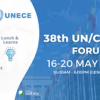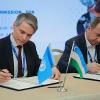News
Displaying Results 51 - 75 of 100
Adapting to climate change and managing the risks of natural and technological hazards in transboundary basins has become critical, as the frequency and intensity of extreme weather events - such as floods, droughts, landslides or storms - are on the rise in the wake of the changing climate. Timely…
UNECE was engaged at the main global forum to assess and discuss progress in implementing the Sendai Framework for Disaster Risk Reduction (DRR) – the seventh session of the Global Platform for Disaster Risk Reduction (GP2022) held in Bali and online, 25-27 May 2022, fully embracing its theme: “…
A large, multidisciplinary team of international experts under the leadership of UNECE is working in Bishkek, assessing the environmental performance of the country by examining developments during the past decade.
The third review of Kyrgyzstan measures progress made and considers challenges…
Recent disruptions of supply chains have exposed fragilities in the current trading system and brought to light the importance of resilience and transparency in global trade.
UNECE and other international organizations play a crucial role in supporting countries (including both the public and…
The textile industry is a key driver of Uzbekistan’s economy, reflected in the country’s rank as sixth largest cotton producer in the world. In 2021, the country accelerated the battle against its child and forced labor violations in cotton harvest according to a new International Labour…
As supply chains within the garment and footwear sector are becoming increasingly complex, the need for transparency is more relevant than ever. Consumers, investors and shareholders are pressing for transparent business activities as well as the prevention and mitigation of risks in value chains,…
Global trade has been transformed repeatedly throughout history, driven by new business processes and new policies. The new advances in digitalization now promise further transformation by making it faster, more transparent, reducing risks of red tape and corruption. With the increase in global…
Over 60 participants worldwide joined the online roundtable organized by the UN Digital transformation group for Europe and Central Asia (DTG4ECA) in the framework of the Regional Forum on Sustainable Development for the UNECE region. Established in May 2020, DTG4ECA group, co-chaired by UNECE and…
As guests of the planet, we human beings can thrive only if our host environment is thriving. We are strongly connected to it, more than we probably understand and more than we probably dare to admit.
Conversely, the ways humans treat the environment has clear negative effects on our health and…
We probably all know what a potato is and how we prefer to eat it. But do you know what a seed potato is, and why seed potato certification matters? And did you know UNECE has a standard for seed potatoes?
Potatoes is one of the easiest vegetables to grow, as old potatoes that have grown buds can…
The second Environmental Performance Review (EPR) of Armenia kicks off in Yerevan under the lead of UNECE and carried out by a large, multidisciplinary team of international experts. This is the 56th EPR since the establishment of the UNECE EPR Programme over a quarter of a century ago. Armenia has…
Strengthening value chains between Africa and the European Union (EU) is a priority objective for sustainable growth and decent jobs across the two continents. Recent market imbalances and disparities, involving supply chain disruptions and lack of attention to the social and environmental impacts…
Today marks the holding of the first meeting of the Working Group on Tailings Safety and the Prevention of Accidental Water Pollution (IIWG) in Kazakhstan – the first comprehensive dialogue on these issues between all relevant stakeholders and national authorities in the country.
After being…
The Caucasus and Central Asia accounts for over 30 million hectares of forests and wooded lands, an area approximately the size of Italy Forest landscape restoration in this area is critical for supporting livelihoods and local economies, preventing soil erosion and desertification, enhancing…
“Countries need to take concrete actions to prevent, prepare for and respond to industrial accidents and reduce the risks of related technological disasters. The UNECE Convention on the Transboundary Effects of Industrial Accidents and the tools developed for its implementation provide a means to…
The global economy enters 2022 with new challenges. Almost two years into the Covid-19 pandemic the digitalization of transport and trade data flows is on top of the economic agenda. In response, UNECE organized its 4th workshop on trade facilitation, Single Window, and data sharing for the Western…
Trade facilitation is a key priority for Kyrgyzstan and its trading community for participation in the global and regional trading system. Under the project on “Strengthening the capacity of the Kyrgyzstan National Trade Facilitation Council to implement the WTO Trade Facilitation Agreement”, UNECE…
Complex global value chains include production facilities scattered all over the world. Sometimes, they may also involve practices of illegitimate subcontracting and undeclared informal work. In fact, their complexity and opacity make it very hard to gain accurate information about how and where…
From the Sandoz chemical spill of 1986 in Schweizerhalle, Switzerland, to the rupture of a dam storing mine tailings containing cyanide in Baia Mare, Romania, 2000; and last year in Beirut, the explosion of ammonium nitrate stored in warehouse near residential areas, what these chemical and…
UNECE is leading a large and diverse group of international experts carrying out the 55th Environmental Performance Review (EPR) since the establishment of the UNECE EPR Programme, 25 years ago. Azerbaijan has requested UNECE to review its environmental performance for a third time. To provide the…
The COVID-19 pandemic has brought about immense changes in how people move around the world. International travel ground almost to a halt at the onset of the crisis, as restrictions were imposed and borders closed. Internal migration, too, was restricted in many countries as lockdowns were declared…
As all eyes turn to Glasgow where world leaders have gathered at COP26 for crucial negotiations to cut greenhouse gas (GHG) emissions and limit global warming, UNECE experts highlight how improved transparency and traceability could be part of the solution. The private sector has a vital role to…
The Group of 7 nations (G7), six of which are UNECE member States (Canada, France, Germany, Italy, the UK and the US), took bold step towards reducing barriers to trade by agreeing on the principles to govern cross-border data use and digital trade. At their meeting in London on 22 October,…
This year, the UNECE region has seen devastating impacts of climate change and multiple natural disasters, such as the floods in Belgium, the Netherlands and Germany. Disasters caused by natural hazards, on the rise due to climate change, can also trigger technological accidents.
On today’s…
The COVID-19 pandemic restrictions have brought the benefits of paperless trading to the forefront of attention. Many countries are considering issuing, accepting and exchanging electronic documents for paperless trading. Issues related to paperless trading are also at the core of World Trade…


























